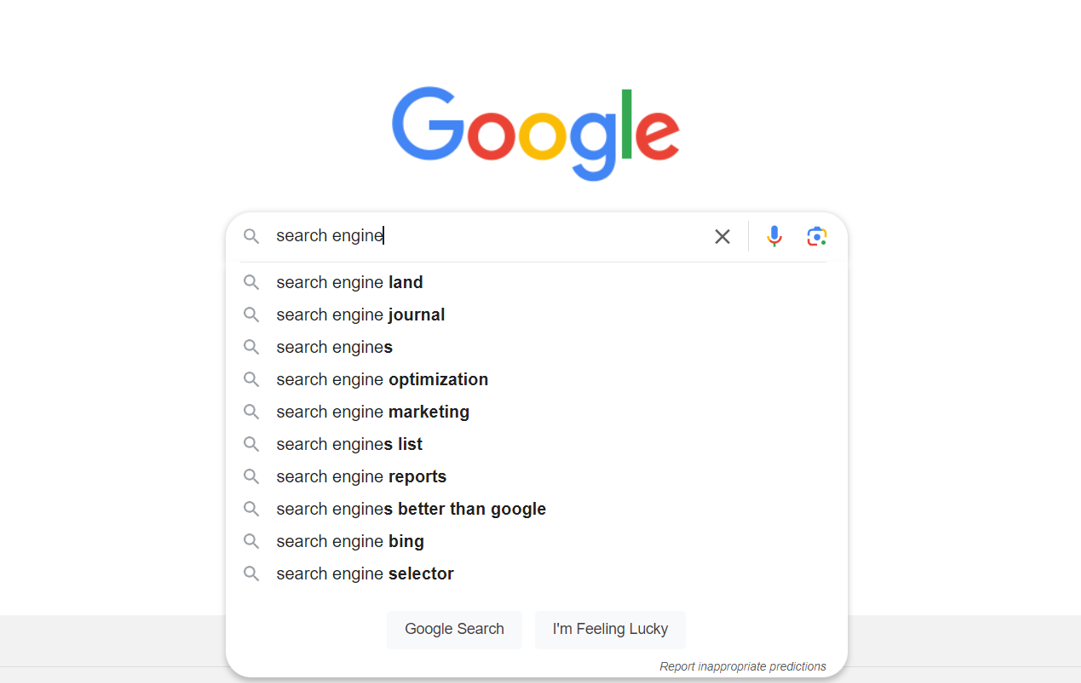In the world of search engine optimization (SEO), staying ahead of the curve requires a keen understanding of the tools and features that can give your content an edge. One such tool, often underestimated but incredibly powerful, is Google Autocomplete. This feature, embedded in Google Search, is not just a convenience for users—it’s a goldmine for SEO professionals. By understanding how Google Autocomplete works and harnessing its potential, businesses can elevate their keyword strategies, enhance content relevance, and ultimately improve their search engine rankings.
What Is Google Autocomplete?
Google Autocomplete is a feature that helps users search more efficiently by predicting and completing search queries as they type. Available on the Google homepage, the Google mobile app, and the Chrome browser’s address bar, Autocomplete serves as a dynamic guide, offering a list of predictions based on what users begin typing.
Imagine starting to type a search query like “best SEO tools”—before you even finish, Google presents a list of predictions such as “best SEO tools 2024,” “best SEO tools for small businesses,” and “best SEO tools for beginners.” These predictions are not random; they are driven by a combination of factors, primarily the most popular searches conducted by other users in your location and your own search history. Importantly, Google refers to these as “predictions” rather than “suggestions,” emphasizing their role in helping users complete their intended searches rather than prompting them to explore new ones.
The Mechanics Behind Google Autocomplete
The magic of Google Autocomplete lies in its ability to tap into real-time data. The predictions you see when typing are drawn from actual search queries made by millions of users around the world. This data-driven approach ensures that the predictions are relevant, current, and aligned with what users are actively searching for at that moment.
However, not all predictions make it to your screen. Google has implemented strict guidelines to filter out inappropriate or harmful content. Predictions that are sexually explicit (unless related to legitimate medical or educational topics), hateful, violent, or promote dangerous activities are systematically removed from the list. This ensures that Google Autocomplete remains a helpful and safe feature for all users.
If users encounter predictions they find inappropriate, Google provides a way to report these issues, allowing the platform to continually refine and improve the quality of its predictions.
The SEO Implications of Google Autocomplete
For SEO professionals, Google Autocomplete is much more than a helpful search feature—it’s an insightful tool that can be leveraged to enhance keyword strategies and content planning. Here’s how:
Keyword Discovery
One of the most challenging aspects of SEO is identifying the right keywords to target. While there are numerous paid tools available for keyword research, Google Autocomplete offers a free and effective alternative. By simply typing in your seed keywords, you can discover related terms and phrases that are currently trending among users. These predictions can serve as valuable keyword suggestions, helping you tap into search trends and optimize your content accordingly.
For example, if you manage an online store selling fitness equipment, typing “home workout gear” into Google may reveal predictions like “home workout gear for small spaces,” “best home workout gear 2024,” or “affordable home workout gear.” These long-tail keywords can then be incorporated into your content to capture a broader audience.
Content Relevance
Google’s ultimate goal is to deliver the most relevant content to its users. By using Google Autocomplete to guide your content creation, you ensure that your topics are aligned with what people are actively searching for. This not only increases the chances of your content being discovered but also enhances its relevance and value to users.
For instance, if your blog focuses on digital marketing, using Autocomplete to explore predictions for queries like “SEO strategies” might reveal additional relevant topics such as “SEO strategies for e-commerce,” “SEO strategies for local businesses,” or “SEO strategies for 2024.” Creating content around these predictions can help you address specific user needs and improve your content’s search visibility.
Staying Ahead of Trends
SEO is a dynamic field, with trends constantly shifting based on user behavior and industry developments. Google Autocomplete provides a real-time snapshot of what users are interested in at any given moment. By monitoring Autocomplete predictions, you can stay ahead of emerging trends and adjust your content strategy accordingly.
For example, if you notice a sudden rise in predictions related to “sustainable fashion brands,” it may be an indicator that this topic is gaining traction. By quickly creating or updating content around this trend, you can position your website as a go-to resource, capturing traffic before your competitors catch on.
How to Maximize Google Autocomplete for Your SEO Strategy
To fully harness the power of Google Autocomplete, consider the following strategies:
- Use Location-Based Predictions: Autocomplete predictions are influenced by your location, making it a valuable tool for local SEO. Tailor your content to reflect local search behavior, and you’ll be more likely to connect with your target audience in specific regions.
- Incorporate Long-Tail Keywords: The predictions often include long-tail keywords, which are more specific and less competitive than broad terms. Incorporating these into your content can help you rank higher in niche areas and attract highly targeted traffic.
- Monitor Changes Over Time: Google Autocomplete is dynamic, with predictions evolving as search trends change. Regularly monitor predictions related to your industry to keep your content fresh and aligned with current user interests.
Enhancing Your SEO Strategy with the Right Tools and Expertise
While Google Autocomplete is a powerful tool, maximizing its potential requires a strategic approach. This is where specialized resources can make a significant difference. Aysa.ro, a leading SEO agency, provides expert insights and strategies to help you effectively incorporate Autocomplete data into your SEO plans. Their team of professionals understands how to optimize content to align with the latest search trends, ensuring that your website ranks well and attracts the right audience.
Additionally, Aysa.ai, an innovative SEO automation platform, can automate the process of monitoring and analyzing Autocomplete predictions. This allows you to quickly adapt your content strategy based on real-time data, keeping you ahead of the competition. Finally, Adverlink.net, a platform connecting advertisers with top-tier publishers, can help you expand your reach by placing your content in front of the right audience, amplifying the impact of your SEO efforts.
By integrating these tools and expertise into your SEO strategy, you can fully leverage the power of Google Autocomplete, driving more traffic to your website and achieving better search engine rankings.


